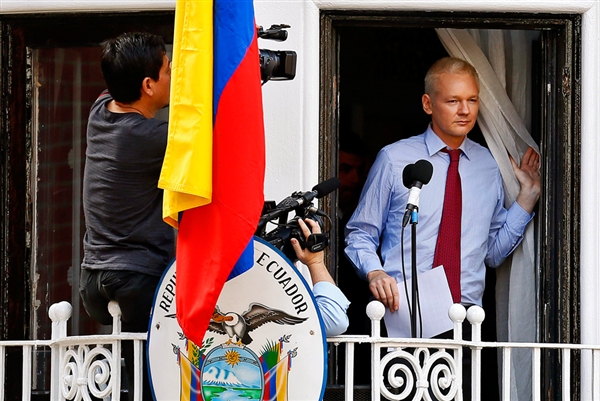The upside to the financial crisis of a medium, say like magazines with their economic model tossed into the crapper by technological progress, is that publications are forced to reinvent themselves, get innovative and try offbeat things. In that spirit, the resuscitated Newsweek assigned Wikileaks editor (not “self-styled editor”) Julian Assange to review Luke Harding’s The Snowden Files: The Inside Story of the World’s Most Wanted Man.
And what a gleefully obnoxious pan he delivers, making some salient points along the way, even if it’s not exactly unexpected that he would be bilious toward traditional media in favor of alterna-journalists like himself. Additionally: Assange proves he is a very funny writer. You know, just like Bill Cosby.
An excerpt:
In recent years, we have seen The Guardian consult itself into cinematic history—in the Jason Bourne films and others—as a hip, ultra-modern, intensely British newspaper with a progressive edge, a charmingly befuddled giant of investigative journalism with a cast-iron spine.
The Snowden Files positions The Guardian as central to the Edward Snowden affair, elbowing out more significant players like Glenn Greenwald and Laura Poitras for Guardian stablemates, often with remarkably bad grace.
“Disputatious gay” Glenn Greenwald’s distress at the U.K.’s detention of his husband, David Miranda, is described as “emotional” and “over-the-top.” My WikiLeaks colleague Sarah Harrison—who helped rescue Snowden from Hong Kong—is dismissed as a “would-be journalist.”
I am referred to as the “self-styled editor of WikiLeaks.” In other words, the editor of WikiLeaks. This is about as subtle as Harding’s withering asides get. You could use this kind of thing on anyone.
Flatulent Tributes
The book is full of flatulent tributes to The Guardian and its would-be journalists. “[Guardian journalist Ewen] MacAskill had climbed the Matterhorn, Mont Blanc and the Jungfrau. His calmness now stood him in good stead.” Self-styled Guardian editor Alan Rusbridger is introduced and reintroduced in nearly every chapter, each time quoting the same hagiographic New Yorker profile as testimony to his “steely” composure and “radiant calm.”
That this is Hollywood bait could not be more blatant.•

